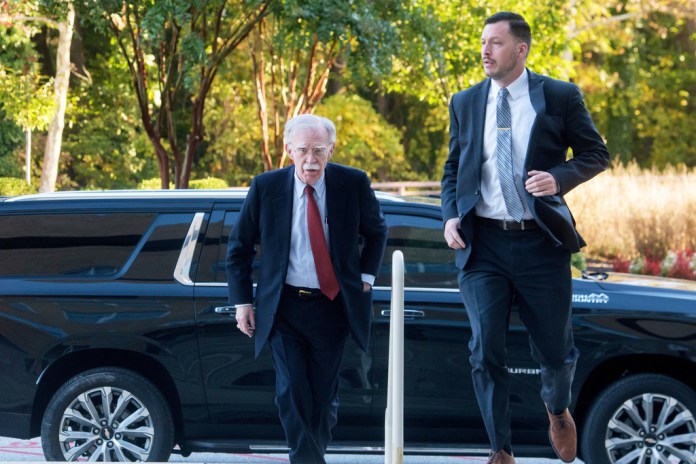Federal prosecutors signaled Friday that former national security adviser John Bolton may face additional criminal charges as the Justice Department continues sifting through a vast collection of materials seized from his Maryland home and Washington office.
At a hearing in Greenbelt, Maryland, Assistant U.S. Attorney Thomas Sullivan told U.S. District Judge Theodore Chuang that the government is still reviewing classified information it alleges Bolton unlawfully shared during President Donald Trump’s first term. The intelligence community must first examine the seized material before any of it can be shown to Bolton’s defense team, a process prosecutors say is complicated by a filter team looking through it for possible attorney-client privilege problems.

“That’s a process that takes time,” Sullivan said, describing a “voluminous” universe of documents that must be sifted through by prosecutors, the intelligence community, and the privilege-review team.
Bolton’s lawyer, defense attorney Abbe Lowell, declined to comment after prosecutors suggested that superseding charges could still be brought in the case, CNN reported. Bolton, who was not present in the courthouse on Friday morning, has pleaded not guilty to eight counts of transmitting national defense information and 10 counts of retaining it.
The hearing revealed new details about the scope and sensitivity of the documents at issue. Prosecutors said 10 diary-style entries that Bolton allegedly sent to his wife and daughter, through unsecured emails and texts, are at the “heart” of the indictment and contain information classified up to the Top Secret level, according to All Rise News. Bolton’s email account was separately compromised by Iranian government hackers, according to prosecutors.
Those entries are part of a broader collection of 65 documents still undergoing intelligence-community reviews, and Lowell told the court that the filter team must comb through “a few thousand pages” to determine “what line in a private diary is classified.”
Sullivan said the material is so sensitive that “this isn’t information that can be stored in any SCIF,” referring to the standard facility required for attorneys to view sensitive or classified documents involved in the case. The government is constructing a temporary secure facility in Washington to allow the defense to review the material before a permanent one is completed in Maryland.
Chuang, an Obama appointee, also repeatedly pressed the DOJ over why its proposed discovery timeline stretched into late May 2026, calling the plan excessive.
“I’m still having trouble with why we need seven months for this,” Chuang said. At one point, he chastised prosecutors for not having completed more of the intelligence-community coordination before bringing charges. “If you actually wanted to indict, you’d want to know what the intelligence community actually needs with these,” he said.
The judge ultimately ordered prosecutors to speed up their proposed production schedule, though neither side requested a trial date. A previously scheduled status conference has been set for October 2026, almost a year from now, underscoring how far the case remains from reaching a jury.
JOHN BOLTON PLEADS NOT GUILTY TO CHARGES IN CLASSIFIED DOCUMENTS CASE
Lowell, for his part, said he would decide which motions to file only after learning more about the classified diary entries and after privilege determinations are complete, stressing that the matter “is not the typical” Espionage Act case involving marked classified documents.
The Washington Examiner contacted a representative for Lowell.
